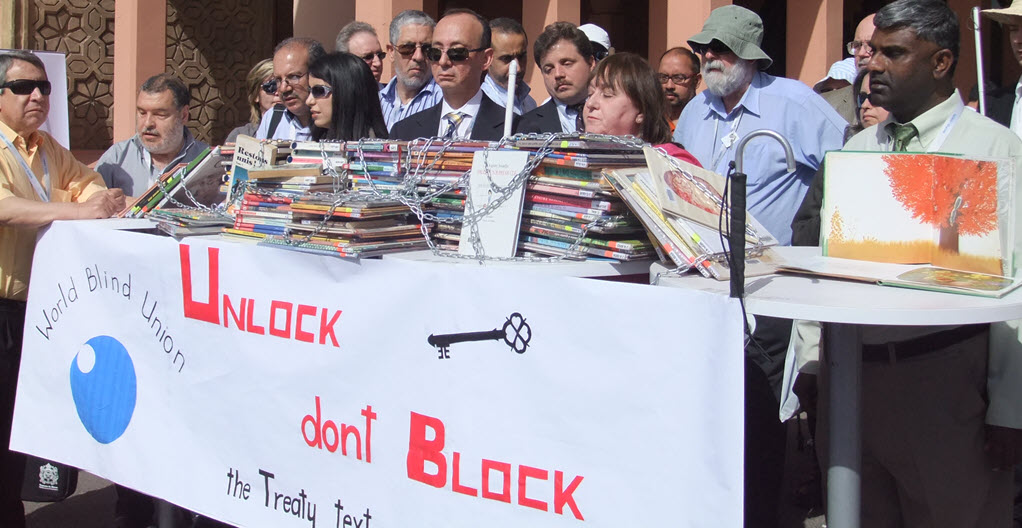The Marrakesh Treaty in Action: What You Need to Know
By , posted on May 8, 2019On May 8, 2019, the United States joins the list of 82 member nations that have fully ratified the long-awaited Marrakesh Treaty to Facilitate Access to Published Works for Persons Who Are Blind, Visually Impaired or Otherwise Print Disabled. If you are wondering exactly what that means, you are not alone. This document outlines the basic provisions and implications of the treaty, especially as it affects the Bookshare community.
Background
The Marrakesh Treaty was adopted to amend copyright law that prevented access to print works for print-disabled people. Only about 7% of published works are made available globally in accessible formats, and in the developing world, where 90% of blind and visually impaired people reside, the figure is less than 1%. This problem is partly due to limitations created by copyright law – limitations that the Treaty seeks to remove. The key changes to the law ensure that an accessible format copy may be made and supplied to a print-disabled person or an institution, such as a library, within a country or across a national border to another ratifying nation.

Timeline of Ratification
- June 27, 2013: The Marrakesh Treaty to Facilitate Access to Published Works for Persons Who Are Blind, Visually Impaired or Otherwise Print Disabled, was adopted by the member states of the World Intellectual Property Organization (WIPO) in Marrakesh, Morocco
- October 2, 2013: U.S. signs treaty as a contracting party
- September 30, 2016: Marrakesh Treaty entered into force with 20 member states.
- October 10, 2018: The Marrakesh Treaty Implementation Act (MTIA) was signed by President Trump. The MTIA amends Section 121 of U.S. copyright law so that its terms are consistent with the Marrakesh Treaty and improve access to accessible materials
- May 8, 2019: U.S. obligations go into effect
Changes to U.S. Copyright Law Expand Types of Literary Works
Section 121 of the U.S. copyright law has been updated and expanded to include dramatic works and musical scores in accessible formats.
What Does this Mean for Bookshare Members in the U.S.?
Bookshare members in the U.S. already have access to over 700,000 books in 47 languages. In the coming months, Bookshare will be able to import books from other Marrakesh-ratifying countries and make them available to Bookshare members in the U.S.
What Does this Mean for Bookshare Members in Marrakesh-Ratifying Countries Outside the U.S.?
Bookshare already shares 600,000 books (out of our total collection of 700,000) with members around in the world. We can do this because of the generosity of our publishing partners – they provide us with an electronic copy of a book and they give us broad distribution rights, often including international distribution rights. The Marrakesh Treaty allows us to add approximately 100,000 more books to the collection that we can share with eligible individuals in other Marrakesh-ratifying countries. These books were previously available to U.S. members only.
The Treaty is a game changer for developing countries, many of whom have a limited number of books in accessible formats like braille. These countries will be able to import books from countries with large existing libraries. For example, Marrakesh Treaty-ratifying countries in Latin America can import Spanish-language books from Spain. Countries that use English in business and academia can import books from large collections developed in English-speaking countries. This free movement of accessible materials in dozens of different languages addresses the book famine – the lack of accessible reading material – for eligible people in every Marrakesh-ratifying country.
What’s Next?
Benetech engineers have been working diligently to prepare the Bookshare platform for the import and export of books. At the same time, we are working with other libraries around the world to make even more books available. We have the opportunity to offer millions of titles to millions of people in the format they want on a device they already have.
I am hopeful that expanding the accessible materials available to people with disabilities will cause “ripple effects” of increasing supply and demand. As the supply of accessible materials increases worldwide, additional countries will see the value and ratify the treaty. Publishers, in turn, will offer more books in accessible formats in order to reach a larger user base. The increased number of consumers—especially in developing nations—will stimulate the demand for books and for low-cost electronic devices.
Learn more about the Marrakesh Treaty
Brad Turner is Vice President and General Manager, Global Education and Literacy
